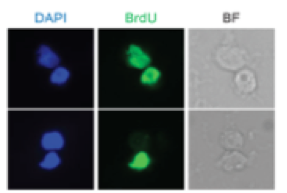One of our projects is focused on such key stem cell property as asymmetric division and specifically, on the non-random template segregation (NRTS) of chromosomes (which is a topic of high controversy).
Our results unambiguously demonstrated NRTS in asymmetrically dividing, human and mouse embryonic stem cells that undergo multi-lineage differentiation in embryoid bodies. 
Moreover, we uncovered that NRTS is dependent on DNA methylation and that the main function of NRTS is to deposit the new, unmethylated DNA strands and de novo methylation enzymes into one daughter cell (facilitating epigenetic change to a new cell fate), while preferentially retaining the already methylated DNA template strands in the other daughter cell (thus maintaining its epigenetic memory). Our current focus is on understanding the role of biomechanics in stem cell asymmetries.

Elabd C, Cousin W, et.al, Conboy IM*, Conboy MJ*. DNA methyltransferase-3-dependent nonrandom template segregation in differentiating embryonic stem cells. 2013, J Cell Biol. 2013(1):73-85.PMID:24127215.